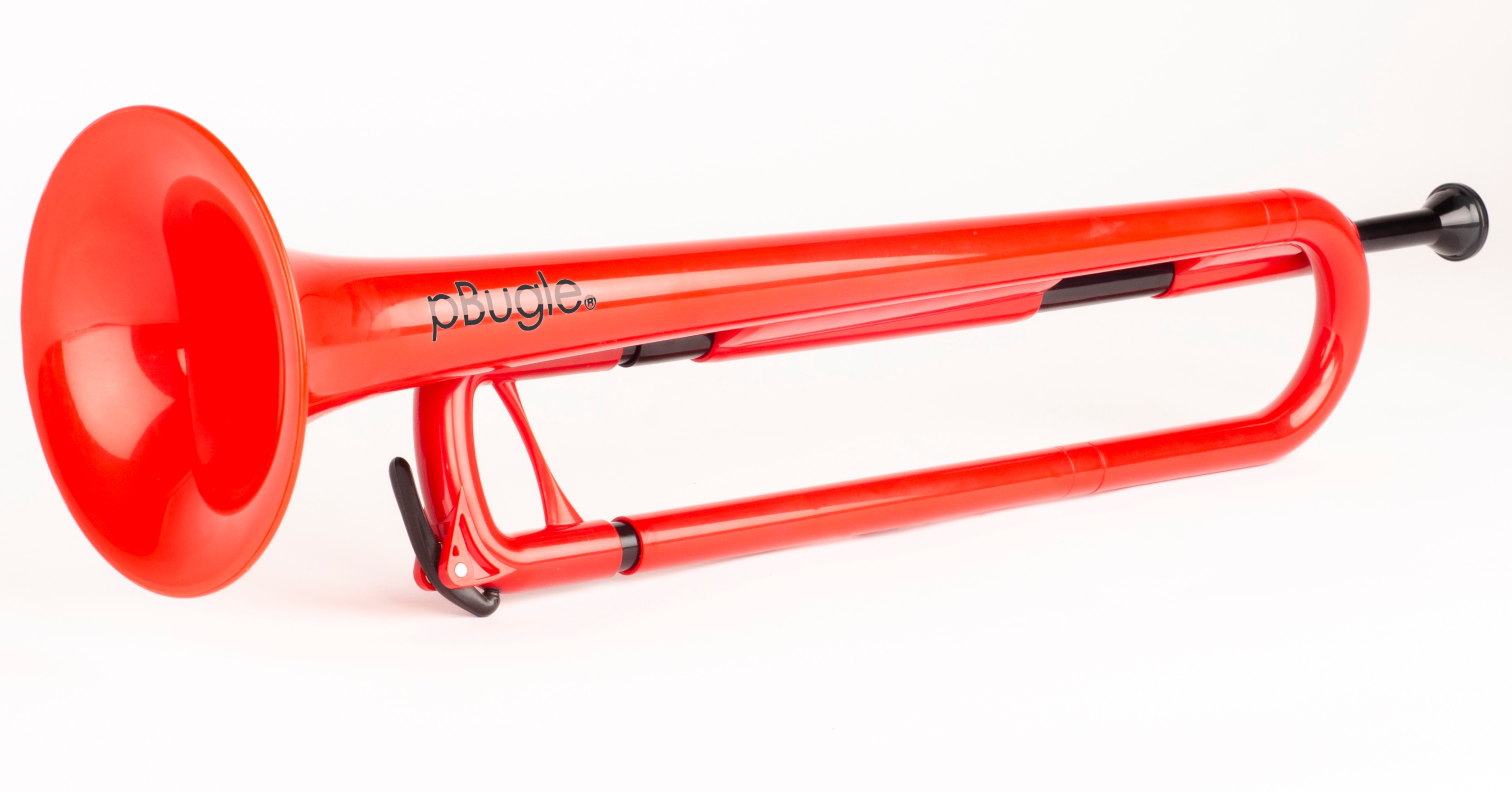Search for topics or resources
Enter your search below and hit enter or click the search icon.

Chris Fower gives a personal account of why we created pBugle, and why it is a great fit for the music classroom.
After the success of the ground-breaking and innovative brass training product pBuzz, feedback began to suggest that although trumpet-based teachers welcomed a simplified training instrument, they didn’t really feel an affinity with the pBuzz, seeing it as more of a “lower brass” offer.
This set my mind to creating an instrument that, like pBuzz, isolated one of the key aspects of brass learning whilst becoming “the easiest way to start your trumpet journey”.
Needless to say, the product would have to “look like a trumpet” and “play like a trumpet” (and sound like a trumpet!) and lead directly to skills that would project a learner more effectively onto their trumpet learning pathway.
I had been looking at the British bugle, which is somewhat different to the American bugle, and thinking about how this was an access point to brass learning for thousands of children in the past. Whilst researching the history of the bugle I came across images and videos of the American G bugle and American musicians playing bugle calls on trumpet for Taps and other ceremonials. Why not create a simple Bb trumpet without valves which could be used to explore that other set of brass playing skills; controlling the harmonics or partials?
Once the idea had formed this was quite technically “doable” using our existing parts and I soon had concept prototypes to show the world. These were met with warm acceptance by many of the trumpet players and teachers we met in the USA and at home here in the UK.
The next stage was to get our pre-production prototypes into the hands of children. Both teachers and ourselves were totally blown away by how quickly the kids made progress “without the complications of valves” (as Tim Hayward, one of my oldest trumpet-playing and teaching friends put it).
In fact, concentrating on breath and buzz allowed the students, who had not played before, to really get to grips with creating a great sound, crossing the partials and never having to worry about playing a “wrong note” (as all our material worked with concert Bb and F at the same time). We have supporting materials to help teachers get new trumpet and cornet players up and running as soon as possible and these pupils will have a really good knowledge and deep understanding of the core skills around breathing, buzzing, making a good sound, articulating and changing harmonics.
 pBugle really plays well so seasoned trumpet players are enjoying blowing on it too. It slots beautifully and is vibrant and alive in the hand so it may well find its place in experienced players' trumpet collections! (did I say that it is really amazing value, retailing at just under £30 including VAT, complete with one of our 7C mouthpieces!).
pBugle really plays well so seasoned trumpet players are enjoying blowing on it too. It slots beautifully and is vibrant and alive in the hand so it may well find its place in experienced players' trumpet collections! (did I say that it is really amazing value, retailing at just under £30 including VAT, complete with one of our 7C mouthpieces!).
I hope that the pBugle might help recruit new trumpet and cornet students, providing a cost-effective and low-risk outreach instrument that can easily be posted to and from pupils’ homes or schools and used in distance learning schemes.
There is a danger of a “lost generation” who didn’t start playing because of the restrictions from Covid 19 and in five or six years we have big gaps in our county and national ensembles. If pBugle can contribute to helping the next generation of young players with their first steps, we all at WMG will be both delighted and proud.
Whether it's bugle calls, Drum and Bugle Corps or “the easiest way to start your trumpet journey”, I’m sure that the pBugle will find a place in the hearts of the trumpet world when it hits the stores in Summer 2020!
Let’s talk about pBugle and its possibilities for your setting. Whether you are interested in; whole class (face-to-face or virtual!), marching bands and carnival, instrument family carousels, recruitment, distance learning or simply a solid start to traditional small group and one-to-one teaching on trumpet and cornet, get in touch to book an online meeting!
More information:
As an undergraduate Chris studied Jazz at Leeds College of Music and then became a member of the Advanced Studies, post-graduate performers course at the Royal Academy of Music and Principal Bass Trombone with the European Community Youth Orchestra under Claudio Abbado. He then spent 25 years as a busy freelance performer based in both London and the North of England working with a wide variety of ensembles and artists, including being a member of Grimethorpe Colliery Band, The British Philharmonic Orchestra, Dame Shirley Bassey’s Orchestra and the Creative Jazz Orchestra.
Alongside this Chris has worked extensively in all areas of music education, latterly as a leading deliverer and trainer in informal, large group practice. This included roles as Leader in Wider Opportunities at Hertfordshire Music Service, Leader of Instrumental Development for Derbyshire City and County Music Partnership and as a face to face trainer on the Trinity Guildhall/Open University “Whole Class Instrumental Learning” national training program.
He became a key member of the team that created pBone, the plastic trombone in 2011/12 and has been involved with pBone Music in various roles since then. Chris is currently the Director of Creativity and Innovation for the company, a role that includes overseeing product development and improvement, quality and education.
Topics: